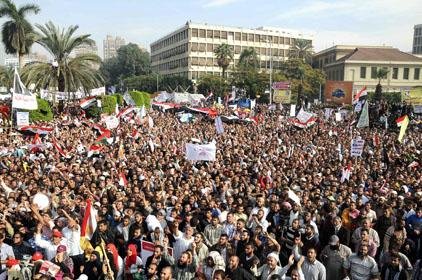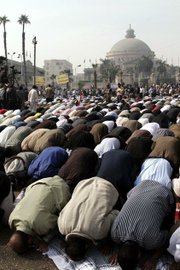CAIRO — Egypt’s President Mohammed Morsi called Saturday for a referendum in two weeks on a contentious draft constitution, setting a date for another milestone in the country’s transition to democracy. Widespread disputes over the charter and Morsi’s recent seizure of near absolute power have marred the process and thrown the country into turmoil.
As has been the case in nearly two years since Hosni Mubarak was ousted, what should have been a cause for national celebration turned into dueling protest between opponents and supporters of how the transition has been managed - largely divided along Islamist and secular lines.
More than 100,000 Morsi supporters organized by the Muslim Brotherhood and ultraconservative Salafi groups took to the streets of Cairo and other cities a day after a sweeping opposition demonstration against his recent decrees giving him immunity from judicial oversight and the charter that was rushed through an assembly packed with allies.
The presidency has been locked in a tug of war with the powerful judiciary and secular and Christian activists since Morsi granted himself far-reaching powers on Nov. 22 in a bid to pre-empt an expected decision by the Supreme Constitutional Court today to dissolve the constitutional panel, as it had done the Islamist-led parliament earlier this year.
Morsi also decreed that courts cannot dissolve the Islamist-dominated upper house of the parliament, known as the Shura Council - another decision scheduled to be before the Constitutional Court today. In protest, most of the nation’s judges have gone on strike.
It was not clear if Egypt’s highest court would go ahead with today’s session. Any move to do so would be a direct challenge to Morsi and could further undermine the charter’s legitimacy. Judges also have threatened to boycott observing the referendum, and the secular opposition promised a civil-disobedience campaign.
“After receiving this draft constitution, and out of keenness to build the nation’s institutions without delay or stalling, I will issue today the call for a public referendum on this draft charter on Saturday, Dec. 15,” Morsi said. “I pray to God and hope that it will be a new day of democracy in Egypt.”
The dispute has thrown Egypt into a fresh round of turmoil after months of protests, rising crime and economic woes.
It also has mobilized an increasingly cohesive opposition leadership of prominent liberal and secular politicians - a contrast to the leaderless youth uprising that toppled Mubarak.
Late Saturday, a few thousand pro-Morsi supporters gathered outside the building of the Supreme Constitutional Court and set up tents, heightening the tension. The turnout of pro-Morsi rallies dwarfed by many multiples the anti-Morsi protests held in recent days.
State television used split screen technology to broadcast scenes from the pro-Morsi rallies as it showed the comparatively meager remnants of an anti-Morsi rally held Friday in Cairo’s Tahrir Square.
The technique emphasized the difference in the size of the crowds the Brotherhood could turn out and those generated by the secularists, liberals and Christians who oppose Morsi’s most recent decree.
The contrast was undeniable - and not just in numbers. The protests Saturday were filled with bearded Islamists and conservative women, many from poorer neighborhoods. Those who went to Tahrir on Friday clearly represented the nation’s upper class, with unveiled women and clean shaven men.
Both sides claim to represent the demands of the “revolution,” Egyptian shorthand for the 18 days of protests nearly two years ago that ended with Mubarak’s ouster.
U.S. State Department spokesman Victoria Nuland lamented the lack of consensus in Egypt’s constitution writing process.
But other U.S. officials said there were internal debates over whether to criticize the draft constitution for limiting freedom of expression, failing to grant freedom of worship, criminalizing blasphemy and eroding women’s rights guarantees.
The officials spoke on condition of anonymity because they weren’t authorized to speak publicly about internal deliberations.
Acknowledging the disagreements, Morsi said he didn’t want to delay the transition and said the draft constitution is another brick in Egypt’s democratic experience.
He also called for a national dialogue in his nationally televised address to the constitutional assembly.
The Muslim Brotherhood, from which Morsi hails, purports that the courts are dominated by Mubarak-era judges trying to stall progress.
“I tell my opponents before my supporters, help me to carry out this responsibility you bestowed upon me in managing the country’s affairs,” Morsi said, urging protesters to take their opposition to the ballot box.
“With us all we build the nation.”
As he announced the date, his supporters holding their rally near Cairo University danced and chanted in celebration. “The people support the president’s decision!” they chanted.
Saturday’s protests were a reminder of the Brotherhood’s mastery of political organization.
At Cairo University, huge crowds converged, transported from around the country by tour buses that lined the streets. Only 24 hours after the constitutional assembly hastily passed the draft constitution, supporters were already donning headbands that read “Yes to the constitution.”
Ralliers carried professionally made signs in support of Morsi, often with the same slogans.
“We love you Morsi,” many read, and “The people support the president’s decisions.”
Ashraf Metawli, a 32-yearold government employee from the Nile Delta province of el-Menoufia who was taken by bus to Cairo for the rally, said the majority of Egyptians are Muslims and its constitution should be an Islamist one.
“This is our belief. We picked the president for Islamic law, and our choice was democratic,” he said. “What Morsi is doing is to get rid of all that is corrupt.”
Just as in the parliamentary elections last year, and presidential elections earlier this year, the Brotherhood demonstrated its ability to get out the vote, often from people who believed Islam was under attack from liberals and secularists. Among the chants people yelled Saturday was “With our blood and our soul, we will defend Islam.” The crowd seemed particularly focused on the proposed Artice Two, which calls for Egyptian laws to be based on the “principle of Shariah” Islamic law.
Across the Nile River, a few thousand of Morsi’s opponents rallying in Cairo’s Tahrir Square raised their shoes to show contempt for the plan.
Th e opposition held sweeping rallies last week, and several hundred are holding a sit-in in Tahrir, the epicenter of the uprising that forced Mubarak to step down last year. They have said they would only participate in a national dialogue if Morsi rescinds his decrees, which they said gave him near-dictatorial powers.
Prominent democracy advocate Mohamed ElBaradei, a Nobel Peace laureate who is a member of the opposition coalition leadership, said on his Twitter account that Morsi put to a referendum a constitution that “undermines basic freedoms and violates universal rights. The struggle continues.”
Mohammed el-Beltagy, a senior Brotherhood member and a member of the constituent assembly, told the Brotherhood-affiliated TV station Misr 25, said the opposition was a media phenomenon.
“We either go to the ballot boxes and let the people be the arbiter, or we can believe that the elite are a substitute for the people.”
Islamists, including the Brotherhood and the more radical Salafi groups, garnered nearly 75 percent of the seats in last winter’s parliament election. But the Supreme Constitutional Court dissolved the parliament in June, setting the stage for the current standoff.
In his speech, Morsi appealed to the judges to carry out their duties, praising their national roles and adding that the state will not challenge their decisions or powers.
Nasser Amin, the head of the Arab Center for the Independence of the Judiciary and the Legal Profession, said Morsi was sending a subtle hint that he didn’t expect the judges to challenge his decrees.
He added that Morsi’s decision to call for a referendum despite a legal challenge hanging over the body that drafted it undermines the referendum’s legitimacy.
“It will be a stillborn constitution,” he said.
Threatening to prolong the standoff, various groups, including religious clerics and university professors, have offered to observe the referendum in case the judges follow through with their threats to boycott it.
Despite wide opposition to the constitution and walkouts by secular and Christian representatives from the panel drafting the constitution, Morsi said the constitution establishes a real democratic system and “is going in the right direction.”
Opponents say the draft charter has a distinct Islamist bent and rights groups have raised concerns about articles that undermine personal and women rights as well as freedoms of expression.
“We want to overcome disagreements and bickering to move toward serious and productive work. There are massive challenges ahead in the future internally and externally,” Morsi said, referring to those who walked out of the panel or are criticizing the draft.
The opposition announced plans for an intensified street campaign of protests and civil disobedience and even a possible march on Morsi’s presidential palace to prevent him from holding a nationwide referendum on the draft.
It is not clear whether the opposition can rally enough voters to shoot down the constitution in a referendum or organize a boycott campaign.
Information for this article was contributed by Sarah El Deeb of The Associated Press and by Nancy A. Youssef and Amina Ismail of the McClatchy Washington Bureau.
Front Section, Pages 1 on 12/02/2012


